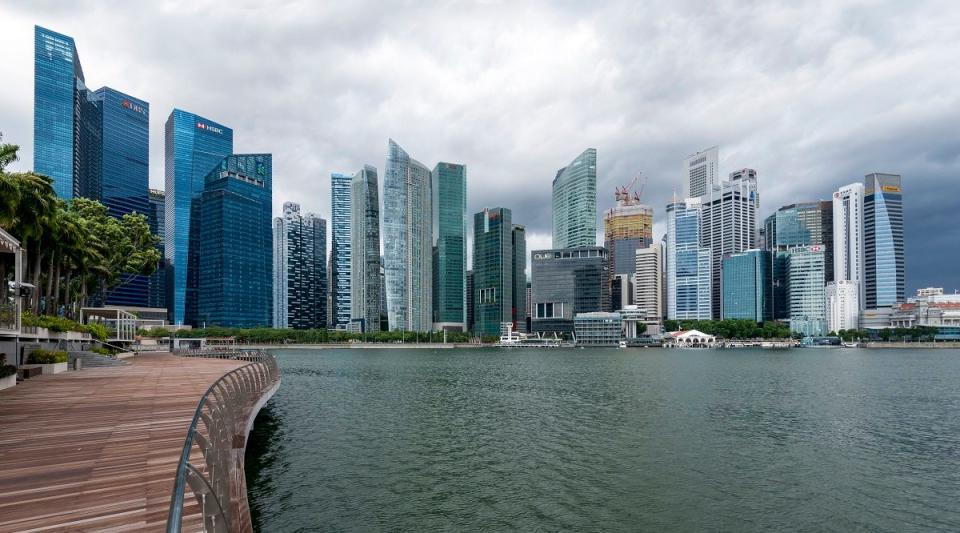Maybank keeps ‘neutral’ call on S-REITS, prefers CapitaLand Integrated Commercial Trust and Mapletree Logistics Trust

The repricing of debt and forex translation losses will affect DPU performance of S-REITs this quarter, says analyst Krishna Guha.
Maybank Securities' Krishna Guha has maintained his “neutral” call on Singapore REITS (S-REITS), ahead of the sector’s results for the 3QFY2023 or 2HFY2023.
In his Oct 12 note, the analysts says that he is “waiting for Godot”, as the repricing of debt and foreign exchange (forex) translation losses are likely to outweigh operational resilience across most sub-sectors, leading to lower distribution per unit (DPU). At the moment, consensus DPU estimates are down 1.5%.
“Low-base effects caused by the pandemic are dissipating, which sets companies up for tougher comparisons for 3QFY2023/2HFY2023. Reversions will be positive as Covid-era rents are marked to market,” Guha notes.
In this quarter’s results updates, Guha says that the market’s focus will likely be on operations and funding costs.
The guidance on interest rates at the most recent US Federal Reserve (US Fed) plots suggests that rates will stay higher for longer, with the three month Singapore Overnight Rate Average (SORA) staying flat and the yield curve becoming less inverted, he notes.
With the re-opening tailwinds and easier comparisons from the pandemic era now behind us, topline growth should represent more of normalized levels, albeit with some help from reversions of pandemic-era leases, he says. Some input costs such as utilities are plateauing, while hiring norms have become more flexible for sectors such as hospitality, which should in turn stabilize margins.
However, debt costs are likely to inch up with additional headwind from rate and forex hedges. There will be an impact from the weakening Chinese renminbi and Japanese yen, the analyst says. Meanwhile, capital recycling is likely to remain a focus area with office and hospitality yielding negative spreads, as opposed to the retail and industrial sectors.
The analyst highlights key things to monitor in each of the following sectors. For the commercial sub-sector, Guha says that there is a stalling of growth in office rents but supply remains tight, while large leases for offices are coming up for renewal. Despite a higher population, retail sales growth is coming in at below inflation, as low-to-mid teens occupancy costs bode for positive retail rent reversion.
“Frasers’ group annual valuation is likely to shine light on Singapore retail and Australian industrial asset values. Net asset value likely to have downward bias, Guha says.
For the hospitality sector, the analyst says that the increase in visitor arrivals remains patchy, while room nights are increasing. Meanwhile, the hiring of foreign manpower should ease cost pressure and enable operators to lower room rates.
Finally, for the industrial sector, Guha says that there has been an impact from the manufacturing slowdown and uncommitted industrial supply, especially in business parks and hi-tech spaces.
On a macro level, the analyst says that the 10-year Singapore government yields are up about 40 basis points (bps) from end-2Q2023, which mirrors the about 9% decline in the S-REIT index over the same period.
Meanwhile, he notes that REIT bond and perpetual prices are down 4.5% over the past three months on average, and the yield curve is less inverted, limiting opportunities to lower funding cost.
“Three-month rates for Singapore dollar (SGD) and US dollar (USD) have inched up 4-5 bps over the quarter. Strength of the SGD (+1.5% q-o-q, +7% y-o-y against key functional currencies) should weigh on forex translation,” he says. “All in, financial conditions have tightened through the period but relative yield spreads have not corrected enough as yet.”
As such, Guha maintains his “neutral” view on the sector, with a preference for liquid large capitalisation on the back of volatile yield curve and uneven growth patterns. He continues to prefer the industrial sub-sector, but notes that it is not immune to the broad slowdown.
“We maintain our view that bonds are better than buildings. The SREIT stocks will witness relief rallies from any pullback in 10-year yields providing tactical opportunities,” he adds.
The analyst's preferred picks for S-REITS are CapitaLand Integrated Commercial Trust C38u (CICT) and Mapletree Logistics Trust M44u (MLT).
As at 11.36am, units in CICT and MLT are trading at $1.80 and $1.59 respectively.
See Also:
Click here to stay updated with the Latest Business & Investment News in Singapore
Expect 'flattish NIMs', 'weak loans' at banks' 3QFY2023 results, 'buy' DBS: Maybank
S-REITs 3Q2023 performance to reflect higher debt costs, weak forex says JP Morgan
Get in-depth insights from our expert contributors, and dive into financial and economic trends

 Yahoo Finance
Yahoo Finance 